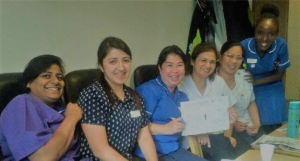Green Ward Competition
Incontinence Pad Use Minimisation - Acute Medical Unit

By: Ashford & St Peter’s Hospital NHS Trust
£500
Goal: To reduce the unnecessary use of incontinence pads on the ward.
Background: When patients come from the Emergency Department to AMU they often have had incontinence pads fitted even when there is no history of incontinence. When they are on AMU incontinence pads are often continued even though the patients can get to the toilet.
Approach: A campaign to change the process of applying incontinence pads was run on the wards with posters and explanations during team meetings.
Savings: Savings identified through the minimisation of incontinence pads amounted to £500 per year. As the ward was exceedingly busy with a high turnaround of staff, the project was considered too time consuming to continue and stopped. It is advised that the project is restarted when staffing is settled and a successful campaign can be run.
The Centre for Sustainable Healthcare runs the Green Ward Competition as a clinical engagement programme for NHS Trusts wishing to improve their environmental sustainability and reduce their carbon footprint.
Shortened Careplans - Falcon Ward
By: Ashford & St Peter’s Hospital NHS Trust
£14,019
143kg CO2e
Goal: To reduce the amount of time spent on irrelevant care plans amounting to high quantities of paperwork for staff.
Background: Falcon Ward identified that significant amounts of avoidable paper work were being completed by staff. This time spent on unnecessary paperwork could be used on patient care and increase staff satisfaction. A staff survey run on the ward found that 80% of staff were dissatisfied with current documentation procedures, 90% of staff spent almost an hour or above on evaluation work including completing paper work during lunch- breaks or out of working hours, and 90% of staff supported a change in evaluation procedure.
Approach:
-
The paper work procedure was re-evaluated
-
Staff will begin to use an evaluation form reduced in size
-
The project is yet to be completed and further details of implementation will be available in future
Savings:
The weekly amount of paper used on evaluation was 787 sheets, based on estimates of paper use reducing to 2 sheets per patient, an estimates 687 sheets of paper would be saved a week. This adds up to 34,350 sheets of paper per year, saving £103 worth of paper procurement and £15 in paper disposal per year. This equates to 143 kgCO2e avoided per year. Based on estimates, 22 hours a week of staff time could be saved on evaluation, this amounts to 1,100 hours and £13,901 per year. Total yearly savings amount to £14,019 and 143kgCO2e.
Ashford & St. Peter's Hospital NHS Trust
To reduce the amount of time spent on irrelevant care plans amounting to high quantities of paperwork for staff.
The Centre for Sustainable Healthcare runs the Green Ward Competition as a clinical engagement programme for NHS Trusts wishing to improve their environmental sustainability and reduce their carbon footprint.
Medication Waste Reduction - Aspen Ward
By: Ashford & St Peter’s Hospital NHS Trust
£26,696 (Estimated)
4,138 kg CO2e (Estimated)
Goal: To reduce medication waste on Aspen Ward.
Background: High levels of wasted medication on the ward inspired the team to tackle medicine waste.
Approach: Aspen Ward communicated their goal during a team meeting and organised their project as a group. They decided on the following:
1. Liaised with key staff in pharmacy - Ward pharmacist, Ward top up technician and head of distribution in pharmacy.
2. The ordering of medication for patients which could be brought in from home via family members.
3. Out of date drugs in Aspen drug cupboards.
4. The labelling of patient drugs as ‘do not send home’ rather than as a TTO.
5. Medications being ordered as TTO’s and not being collected by patients.
Savings: The project save £6,674 in four months, which projects to £26,696 over a year. Using the SDU pharmaceuticals carbon conversion factor this equates to 4,138 kg CO2e per year.
Aspen Ward
The Centre for Sustainable Healthcare runs the Green Ward Competition as a clinical engagement programme for NHS Trusts wishing to improve their environmental sustainability and reduce their carbon footprint.
Reduction of Routine blood tests - Cherry Ward
By: Ashford & St Peter’s Hospital NHS Trust
£16,373
11,511 kg CO2e (Estimated)
Goal: To reduce the amount of routine blood tests run on the ward by 10-15%.
Background: Cherry Ward identified that medically fit patients were receiving daily blood-tests unnecessarily. It is estimated that the routine blood tests could be reduced by as much as 10-15%. The suggested method would be to identify which medically patients have received blood tests during lunchtime meetings and to make a note that a blood test is unnecessary on that day.
Approach:
Due to delays over the winter period, the project was unable to run. However, the team at Cherry Ward are keen to push this ahead when there is time.
Savings:
The Cherry Ward does roughly 20 routine blood-tests per day. A 15% reduction would result in 3 fewer blood- tests per day. It is estimated that the total cost of a blood test is £20. This includes: a) the materials such as syringe, test-tube, cotton and gauze, b) disposal costs in the high-cost sharps waste-stream, and c) the cost of transport and analysis from Frimley, where bloods are analysed. The annual cost savings of reduced blood tests could therefore be £15,000. Using a carbon conversion factor combining medical equipment, waste products and travel, the carbon reductions could amount to 11,511 kgCO2e. An estimated 10-15 minutes is required per blood test on Cherry Ward. A conservative estimate of 30 minutes would be saved a day on blood tests, amounting to, 125 hours of time saved a year, £1,373 per year in band 3 time. The total annual savings of this project could amount to £16,373 and 11,511 kgCO2e or beyond.
Ashford and St Peter's Hospital NHS Trust
To reduce the amount of routine blood tests run on the ward by 10-15%
The Centre for Sustainable Healthcare runs the Green Ward Competition as a clinical engagement programme for NHS Trusts wishing to improve their environmental sustainability and reduce their carbon footprint.
The Centre for Sustainable Healthcare runs the Green Ward Competition as a clinical engagement programme for NHS Trusts wishing to improve their environmental sustainability and reduce their carbon footprint.
Shortened Admission Booklet – Surgical Assessment Unit (SAU)

By: Ashford & St Peter’s Hospital NHS Trust
4,793.15 (Estimated)
65.4 kg CO2e
Goal: To reduce the paper work associated with short-term admissions.
Background: The unit decided to review the use of admission booklets for patients. The team identified that admissions booklets for short-stay patients were too long and used an unnecessary amount of time and paper. By reducing the short-stay admissions booklet the team realised that they would be able to dedicate more time to patient care while reducing paper procurement and paper waste.
Approach:
-
The SAU team worked together to assess the admission booklet.
-
Together, they identified the key pages to keep and reduced the
booklet from 27 pages to 6 pages.
-
They began using the 6-page admission booklet with short-stay
patients, roughly 3 or 4 a day.
Savings:
The annual paper savings from the admission booklet reduction, assuming 4 shortened booklets a day, amount to 15,750 sheets of paper. This totals to 6.3 boxes of paper at £7.50 each, generating a yearly procurement saving of £47.25. Further downstream, this averts 69 kg of paper from the waste stream, generating an additional £6.90 in yearly recycling costs. The yearly carbon savings from this amount to 64 kg CO2e for paper production and 1.4 kg CO2e for paper disposal. The time savings for the work are impressive, with 1.5 hours of band 5 nurse time save a day, amounting to 375 hours a year. Assuming a £23,000 salary cost for a band 5 nurse, the yearly time savings amount to £4,739. The total annual savings could amount to £4,793.15 and 65.4 kg CO2e.
Surgical Assessment Unit, Ashford & St Peter's hospitals
To reduce the paper work associated with short-term admissions.
The Centre for Sustainable Healthcare runs the Green Ward Competition as a clinical engagement programme for NHS Trusts wishing to improve their environmental sustainability and reduce their carbon footprint.
The Centre for Sustainable Healthcare runs the Green Ward Competition as a clinical engagement programme for NHS Trusts wishing to improve their environmental sustainability and reduce their carbon footprint.
